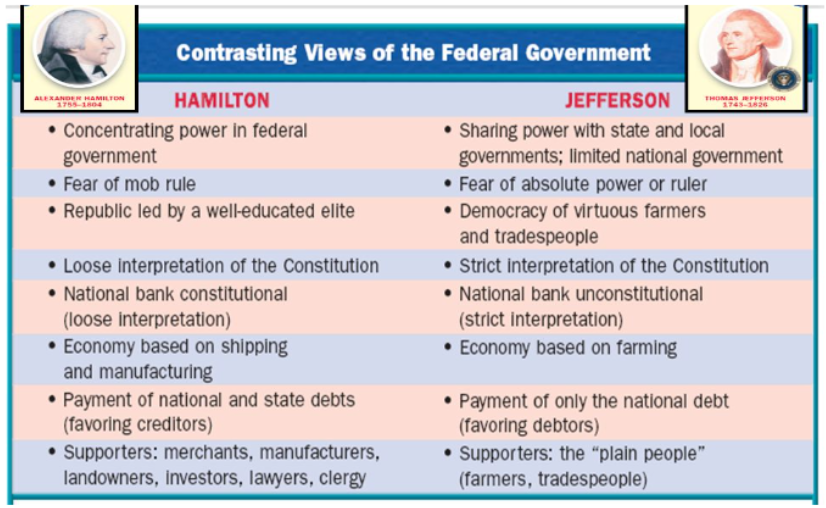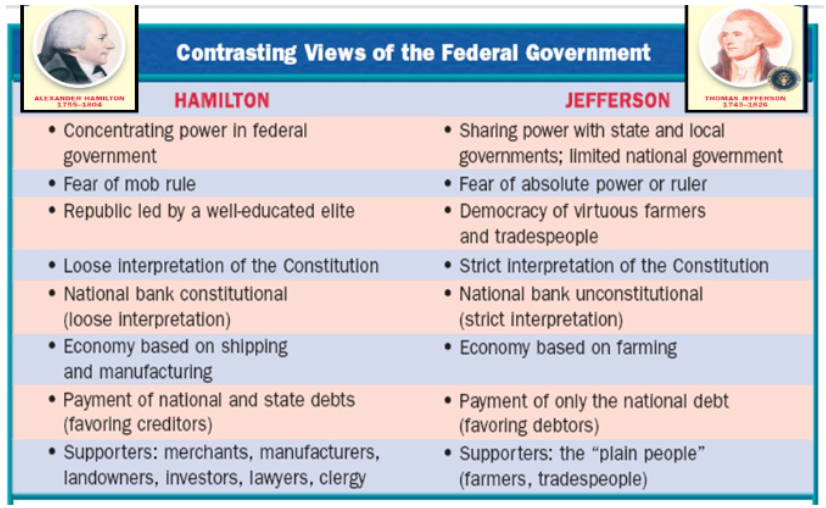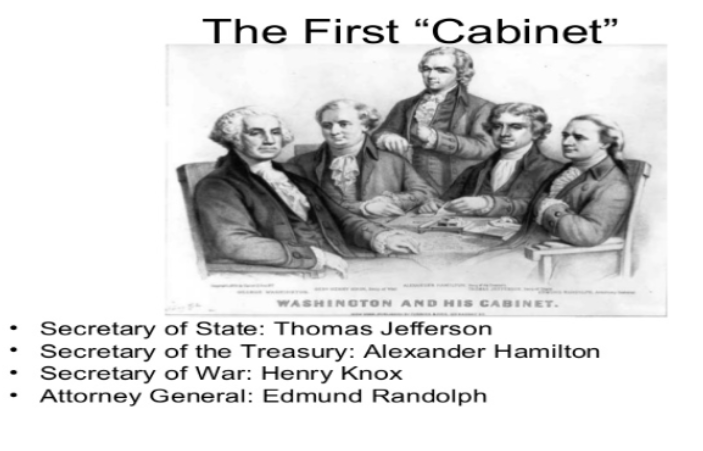US History 1 - Chapter 6 Quiz
5.0(1)
Card Sorting
1/43
Earn XP
Description and Tags
Chapters 6.1-6.3, all classwork since 11/22, charts on Classroom, and Jeopardy answers
Study Analytics
Name | Mastery | Learn | Test | Matching | Spaced |
|---|
No study sessions yet.
44 Terms
1
New cards
What were Hamilton’s views on the federal government?
\- Concentrating power in the federal government
\- Fear of mob rule
\- Republic led by a well-educated elite
\- Loose interpretation of the Constitution
\- National bank constitutional (loose interpretation)
\- Economy based on shipping and manufacturing
\- Payment of national and state debts (favoring creditors)
\- Supporters: merchants, manufacturers, landowners, investors, lawyers, clergy
\
__TLDR__: He wanted loose interpretations of the Constitution & power to the federal government. He was supported by the elite and wanted an elite to be the president
\- Fear of mob rule
\- Republic led by a well-educated elite
\- Loose interpretation of the Constitution
\- National bank constitutional (loose interpretation)
\- Economy based on shipping and manufacturing
\- Payment of national and state debts (favoring creditors)
\- Supporters: merchants, manufacturers, landowners, investors, lawyers, clergy
\
__TLDR__: He wanted loose interpretations of the Constitution & power to the federal government. He was supported by the elite and wanted an elite to be the president

2
New cards
If you were a lawyer, would you support Hamilton or Jefferson?
Hamilton
3
New cards
What were Jefferson’s views on the federal government?
\- Sharing power with the state and local governments (limited national government)
\- Fear of absolute power or ruler
\- Democract of virtuous farmers and tradespeople
\- Strict interpretation of the Constitution
\- National bank was unconstituitonal (strict interpretation)
\- Economy based on farming
\- Payment of only the national debt (favoring debtors)
\- Supporters: the “plain people” (farmers, tradespeople)
\
__TLDR__: He wanted strict interpretations of the Constitution & power to the state governments. He was supported by the plain people and did not want a ruler
\- Fear of absolute power or ruler
\- Democract of virtuous farmers and tradespeople
\- Strict interpretation of the Constitution
\- National bank was unconstituitonal (strict interpretation)
\- Economy based on farming
\- Payment of only the national debt (favoring debtors)
\- Supporters: the “plain people” (farmers, tradespeople)
\
__TLDR__: He wanted strict interpretations of the Constitution & power to the state governments. He was supported by the plain people and did not want a ruler

4
New cards
If you were a farmer, would you be in support of Hamilton or Jefferson?
Jefferson
5
New cards
Who was in the first cabinet? What were their positions?
Secratary of State - Thomas Jeffeerson
Secretary of the Treasury - Alexander Hamilton
Secretary of War - Henry Knox
Attorney General - Edmund Randolph
Secretary of the Treasury - Alexander Hamilton
Secretary of War - Henry Knox
Attorney General - Edmund Randolph

6
New cards
What were Hamilton’s views on the Bank of the US?
\- Safe place to deposit and transfer money
\- Provide loans to government and state banks
\- A national currency (consistency & less responsibility to the individual states - this ties back into Hamilton wanting power to go to the federal gov)
\- An investment by people to buy stock into US bank
\- Consitution did not forbid a national bank (due to the loose construction of the Constitution - again, Hamilton was in favor of a loose Constitution & a strong federal gov)
\- National debt was good for the country
\
__TLDR__: National bank was good & constitutional - it would create consistency and a safe place to deposit/transfer money
\- Provide loans to government and state banks
\- A national currency (consistency & less responsibility to the individual states - this ties back into Hamilton wanting power to go to the federal gov)
\- An investment by people to buy stock into US bank
\- Consitution did not forbid a national bank (due to the loose construction of the Constitution - again, Hamilton was in favor of a loose Constitution & a strong federal gov)
\- National debt was good for the country
\
__TLDR__: National bank was good & constitutional - it would create consistency and a safe place to deposit/transfer money
7
New cards
What were Jefferson’s views on the Bank of the US?
\- Against the Constitution
\- State banks would collapse (Jefferson was in favor of power to the states)
\- Only the wealthy could invest in the bank (The wealthy would gain control over the bank first and then the gov - Jeff was in favor of the common people, not the wealthy)
\- Hurt the common man (^^)
\- Strict construction of the constitution (bcs there is no national bank in the Constitution it can’t be made)
\- Against a national debt
\
TLDR: National bank was bad: it would give too much power to the wealthy - and unconstitutional: it wasn’t mentioned in the Constitution
\- State banks would collapse (Jefferson was in favor of power to the states)
\- Only the wealthy could invest in the bank (The wealthy would gain control over the bank first and then the gov - Jeff was in favor of the common people, not the wealthy)
\- Hurt the common man (^^)
\- Strict construction of the constitution (bcs there is no national bank in the Constitution it can’t be made)
\- Against a national debt
\
TLDR: National bank was bad: it would give too much power to the wealthy - and unconstitutional: it wasn’t mentioned in the Constitution
8
New cards
What were Washington, Jefferson, and Hamilton’s political parties?
Washington - No parties (he always tried to stay neutral)
Jefferson - Democratic-Republican
Hamilton - Federalist
Jefferson - Democratic-Republican
Hamilton - Federalist
9
New cards
What were Washington, Jefferson, and Hamilton’s views on foreign affairs?
Washington - Neutrality - with some commercialism (maximizing profit)
Jefferson - Fighting for freedom by joining France
Hamilton - Stay out of the French Revolution
Jefferson - Fighting for freedom by joining France
Hamilton - Stay out of the French Revolution
10
New cards
What were Washington, Jefferson, and Hamilton’s views on reading the Constitution?
Washington - Whatever works best for creating national
Jefferson - Strict reading (following it exactly/word for word)
Hamilton - Flexible (bending the Constitution to work with the situation it is being applied to)
Jefferson - Strict reading (following it exactly/word for word)
Hamilton - Flexible (bending the Constitution to work with the situation it is being applied to)
11
New cards
What were Washington, Jefferson, and Hamlton’s views on business?
Washington - Whatever works best for Amerca
Jefferson - Agriculture best (doing what benefits the agriculture business/common people)
Hamilton - Trading, manufacturing, mercantilism best (doing what benefits the trading, manufacturing, and mercantilism businesses/elite people)
Jefferson - Agriculture best (doing what benefits the agriculture business/common people)
Hamilton - Trading, manufacturing, mercantilism best (doing what benefits the trading, manufacturing, and mercantilism businesses/elite people)
12
New cards
What were Washington, Jefferson, and Hamilton’s views on public apprach/persona?
Washington - Unifier, peacemaker in the government, cool under pressure, quiet leader
Jefferson - Philosopher, self-proclaimed man of the people, free speech, farmer, a supporter of the French
Hamilton - Fiery, ambitious, elitist, business first, competitive, will fight to get points across
Jefferson - Philosopher, self-proclaimed man of the people, free speech, farmer, a supporter of the French
Hamilton - Fiery, ambitious, elitist, business first, competitive, will fight to get points across
13
New cards
What was the Judiciary Act of 1789?
The Judiciary Act of 1789 was an act created by Congress under Article 3 of the constitution that established the court system of the US. It was signed into law by George Washington.
After the courts were established, the Supreme Court ruled that the act was unconstitutional as it gave the Supreme Court more authority than it was supposed to be given under the Constitution. Dxispute was created around the difference between the Supreme Court’s original jurisdiction (disputes between the states/high ranking members of gov) and its appellate jursidiction (ability to review decisions made in the lower courts)
\
__TLDR__: This act created courts. Later, the courts decided that the act was unconstitutional bcs it had given the courts too much power
After the courts were established, the Supreme Court ruled that the act was unconstitutional as it gave the Supreme Court more authority than it was supposed to be given under the Constitution. Dxispute was created around the difference between the Supreme Court’s original jurisdiction (disputes between the states/high ranking members of gov) and its appellate jursidiction (ability to review decisions made in the lower courts)
\
__TLDR__: This act created courts. Later, the courts decided that the act was unconstitutional bcs it had given the courts too much power
14
New cards
Washington was the first to create this group of presidential advisers under the constution:
Cabinet
15
New cards
This cabinet post is to handle the Government finances:
Departnment of the Treasury
16
New cards
Although he had no interest in being President, this former General was a unanimous choice by Congress to be president:
George Washington
17
New cards
This Secretary of State for George Washington favored strict interpretation of the Constitution:
Thomas Jefferson
18
New cards
This entity was created to handle paper money and tax receipts and other government funds:
Bank of the United States
19
New cards
President Washington took this position on the French Revolution:
Neutrality
20
New cards
During Washington’s presidency, what country still held Florida and the Louisiana Territory:
Spain
21
New cards
This leader was Chief of the Miami Indian Nation:
Little Turtle
22
New cards
This term describes the problem of the government placing the interest of one geographic region over that of another instead of the Nation as a whole:
Sectionalism
23
New cards
Federalists pushed through this law to prevent false, scandalous, and malicious statements against the government”:
Alien and Sedition Acts (Seditation)
24
New cards
At the Constituional Convention, what was the name of the idea that Congress coulld veto only Unconstitutional State Laws:
Limited Federal Negative
25
New cards
This term describes the principle that some Republicans wanted which would allow states to void any Federal law:
Nullification
26
New cards
This was the name of the scandal where 3 French officials tried to bribe American officials who were trying to avoid war with France during John Adams Presidency:
X, Y, Z affair
27
New cards
John Adams belonged this political party:
Federalist Party
28
New cards
These people resisted settlers who went West after the 1783 Treaty of Paris:
Native Americans
29
New cards
Frenchman Edmond Genet enraged Washington because he did this:
Recruiting Americans for the French Revolution
30
New cards
The first two political parties that were formed during Washington’s presidenct were the:
Democratic-Republicans and the Federalists
31
New cards
This Founding Father favored an economy based on shipping, banking, and manufacturing:
Alexander Hamilton
32
New cards
This foundign father favored an economy based on Agriculture:
Thomas Jefferson
33
New cards
This Act was one of the first tasks Washington and Congress had to “tackle”:
The Judiciary Act of 1789 - which created the Judiciary system
34
New cards
This future secretary of the Treasurey served as Washington’s Right Hand Man during the Revolution:
Alexander Hamilton
35
New cards
Why did federal law have to be “the supreme Law of the Land” in the new nation?
Because it was guaranteed under Article 6 of the Constitution
36
New cards
What is the cabinet?
The president’s chief advisers
37
New cards
What is the protective tariff?
an import tax on goods produced in Europe
38
New cards
What is the excise tax?
A tax on a product’s manufacture, sale, or distribution
39
New cards
What is neutrality? Why did the United States want to maintain it?
Neutrality is a statement to support neither side in a conflict (__neutral__ity = being __neutral__). It was important for the US to maintain neutrality because entering the war was not in the nation’s best interest
40
New cards
Who was Edmond Genêt?
He was a French diplomat who was sent to America to gain support. He did not follow the diplomatic protocols of America, which outraged Washington. Washington tried to demand that the French recalled Genêt (forced him to go home) but his political backers had fallen from power and would not/could not bring him home. Genêt stayed in the US and became a legal citizen
\
__TLDR__: He was a French diplomat who outraged Washington and was forced to become a US Citizen
\
__TLDR__: He was a French diplomat who outraged Washington and was forced to become a US Citizen
41
New cards
Who was Thomas Pinckney?
He was the US minister to Great Britain who signed the Pinckney’s Treaty of 1795 (AKA Treaty of San Lorenzo), which gave Britain almost everything from Spain that the Americans wanted, including all claims of land east of the Mississippi (except Florida) and to open the Mississippi River to traffic by Spanish subjects and US Citizens
42
New cards
Who was John Marshall?
He was a Federalist and hte chief justice on the Supreme Court of the United States (SCOTUS). He served for over 30 years and strengthened the power of SCOTUS and the federal gov
43
New cards
What were the midnight judges?
Federalist federal judges who were appointed by Adams late on the last day of his administration (right before he had to step out of power)
44
New cards
What was Marbury v Madison and why was it important?
It gave the Supeme Court the ability to declare an act of Congress unconstitutional (judicial review)